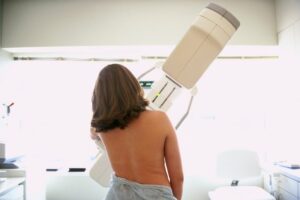
Popular CT Scans Could Account for 5% of All Cancer Cases A Year
Radiation from imaging could lead to lung, breast and other future cancers, with a 10-fold increased risk for babies.
“The danger is greatest for infants, followed by children and adolescents. But adults also are at risk, since they are the most likely to get scans. Nearly 103,000 cancers are predicted to result from the 93 million CT, also known as CAT, scans that were performed in 2023 alone. This is 3 to 4 times more than previous assessments, the authors said.
Radiation from imaging could lead to lung, breast and other future cancers, with a 10-fold increased risk for babies. (The original article is here.) Smith-Bindman RChu PWAzman Firdaus H, et al. Projected Lifetime Cancer Risks From Current Computed Tomography Imaging. JAMA Intern Med. Published online April 14, 2025. doi:10.1001/jamainternmed.2025.0505
““Our estimates put CT on par with other significant risk factors, such as alcohol consumption and excess body weight,” [Smith-Bindman} said. “Reducing the number of scans and reducing doses per scan would save lives.”
A new study from UC San Francisco, published in JAMA Internal Medicine, warns that computed tomography (CT) scans may contribute to up to 5% of all annual cancers in the U.S.—about 103,000 cases from the 93 million scans performed in 2023.
- CT scans may cause up to 5% of all annual cancers in the U.S., with over 100,000 cases projected from 2023 alone.
- Infants and young children face the highest cancer risk, especially from head scans, due to their developing tissues and higher sensitivity to radiation.
- Adults aged 50–69 receive the most scans, and thus account for the highest total number of radiation-induced cancers.
- Abdomen and pelvis CTs in adults and head CTs in children are the leading contributors to cancer risk by scan type.
- Many CT scans are unnecessary, particularly those ordered for mild respiratory symptoms or headaches without alarming features.
- Radiation dose varies widely across facilities, with some patients receiving unnecessarily high doses that elevate cancer risk.
- Few patients and families are informed about the risks, especially in pediatric cases, limiting informed decision-making.
- Reducing the number of CT scans and standardizing lower radiation doses could significantly decrease future cancer cases and save lives.
I was alerted to this harm, and other harms of over testing and over treating by Rita Redberg at a conference many years ago now in 2012. But what she said has helped inform my approach and sensitivity to over-treatment and over-testing. In my book, Radical Resilience the chapter called Do No Harm, is foundational to understanding the need for additional mental models and approaches to medical conditions.
In this blog post/youtube she talks about the harms of imaging. She says that she has been placed on a list of the 10 biggest threats to Cardiac Imaging, which she wears as a badge of honor.
Vinay Prasad says how, looking at the data, he sees that CT scans will find lung cancer, but he’s not convinced that they extend life.
From Zdogg and Rita redberg
https://youtube.com/clip/UgkxPDSpgtkoH4QoZT4eqqzj8PDXMb2AKaaA?si=IXzTHu-pZ1GbwnMj
Why not just get the test? People really think that tests will help. Even MD’s too.
https://youtube.com/clip/UgkxDTPDhbmSrF6t7ocRcSQlDk4KTYePojFg?si=467GugiOGfX9CtLu
Discussing why the tech mindset just doesn’t really work when it comes to health and the human body. More information is NOT always helpful. It’s information that we don’t always know what to do with. Dr. Redberg says, “if you need to have a test to find out if you have a disease, perhaps you just shouldn’t have the test.” Of course there are caveats. But if you’re healthy think risk benefit. She tells her patients who have been diagnosed with osteopenia, the way to cure it is to stop getting the test.
https://youtube.com/clip/Ugkx3M_c6Mfp9JafsXt-ooqxKCYut6TrstAB?si=R_Rlg6qk2TIUmSvA
In this clip, one of Zdogg’s relatives had a bad outcome just from a bisphospinate
https://youtube.com/clip/UgkxmXnUBa4lwTl5IU5omSU8465m9C4fv4s7?si=wXS8Wd8DPr6v8qQS
In this clip, they’re advocating for a more “holistic” way of looking at the body, which, of course, I advocate for in my book, Radical Resilience.
https://youtube.com/clip/Ugkx6SM0TOvlC0-L9sSokL1ASFJajuJshJPO?si=rj4__114o-nGKw7C
reductionist
List of threats to interventional cardiogists. Why this is important, is that there are many commonly accespted interventions, like cardiac stents, which have a much higher risk than commonly thought. Dr. Redberg has been courageous and outspoken in demanding data and clinical risk assessment for many popular interventions.
https://youtube.com/clip/UgkxBo2SciQ2jfiOJEgMvLSSVla2LaBz9sjM?si=0k8GBqSq07LJ-uuJ
I highly, HIGHLY recommend watching the entire video . You can watch the podcast here. podcast, please click here.


